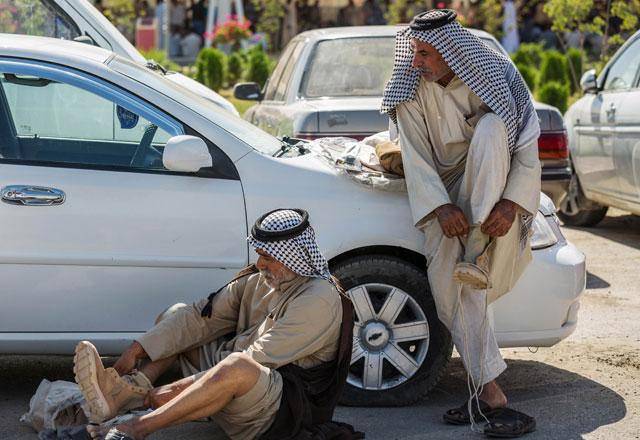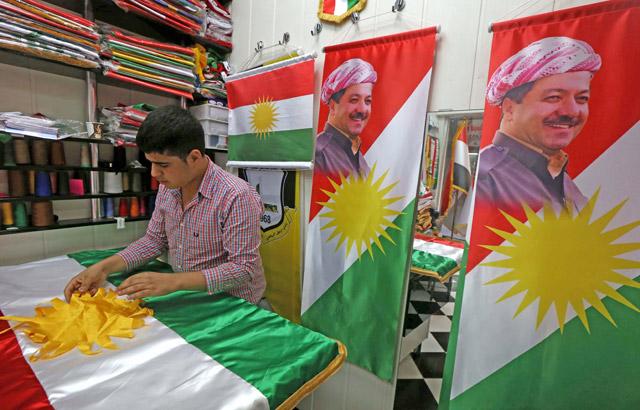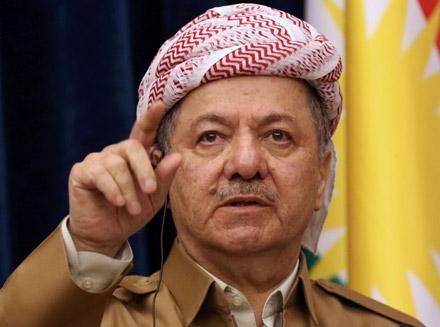You are here
At Mideast forum, hopes for future amid chaos
By AP - May 23,2015 - Last updated at May 23,2015
SOUTHERN SHUNEH,Jordan — Against a backdrop of Iraq and Syria in flames, Middle Eastern political and business leaders sought to focus on a future of growth and investment for a region that for long has lagged behind. But present-day reality proved rather difficult to ignore, with Daesh wreaking havoc not far from these Dead Sea shores.
"We are all aware of the crises in the news," host King Abdullah of Jordan told invitees at the regional World Economic Forum, held at a Dead Sea resort whose calm belied the mayhem raging a few hours' drive away.
"But there is another, deeper reality," the monarch optimistically went on. "Throughout the Middle East and North Africa, more than 350 million people are striving, economies are growing, youth are achieving, obstacles are being tackled. ... New possibilities, new human potential, new assets are uncovered."
There is validity in the claim of a glass part-full.
Egypt's economy may be turning after several disastrous years since the 2011 overthrow of Hosni Mubarak ushered in a period of instability and violence; its stock market flourishes and its credit rating inches ahead. The emirates of the Gulf are veritably booming. Tunisia's democratic transformation flirts with bona fide success. And Jordan itself, despite a flood of refugees from Syria, has maintained a modest level of economic growth.
Then there is the empty part — possibly more than half the glass.
Despite the upheaval once known as the "Arab Spring", democracy has not much struck root in the region. Some places didn't even try. Some made tentative attempts. In Libya, the whole thing collapsed in ruin: The place has competing hapless governments, is run by wild militias, and has become a haven of seafaring migrant traffickers.
Wars rage not only in Syria and Iraq but now also in Yemen, where Shiite rebels have seized the capital, Sanaa, and much of the country and now find themselves under blistering air attack from a Sunni coalition led by Saudi Arabia. An anticipated ground invasion, most likely in Yemen's port of Aden, has not materialised. And over almost two months the air campaign alone has caused some damage to its targets, but failed to dislodge them.
Perhaps surprisingly, something similar can be said of the US air campaign that may have inspired the one in Yemen — this one against the Daesh group.
In an offensive that began in earnest a year and a half ago, the Al Qaeda breakaway group has taken over huge swaths of Iraq and Syria, mainly in those countries' Sunni areas. In areas they seize their Sunni cohorts welcome them sometimes — but generally they rule by terrorising the local population, and their murderous brutality towards political rivals and non-Muslims has been shocking.
The air campaign that began nine months ago — combined with a Kurdish effort on the ground — seemed to at least arrest the group's progress. Indeed, they were expelled from Saddam Hussein's hometown of Tikrit in Iraq, and rebuffed from the Syrian Kurdish town of Kobani.
But this week the group overran the Syrian town of Palmyra, home to unrivalled Roman-era historic sites, and dangerously close to Homs, a key stronghold of Bashar Assad's government.
A week earlier the group seized the Iraqi town of Ramadi, nearly completing its takeover of western Anbar province, putting the jihadists close to Baghdad.
That brought a dramatic appeal from Iraqi officials at the conference.
Deputy Prime Minister Saleh Al Mutlaq called the fall of the city a "big disaster" and appealed for a "new strategic plan" for Iraqi and international coalition forces to "terminate" the Daesh in Iraq. Mutlaq told The Associated Press that allowing the Daesh to control Anbar "is unacceptable and the capacity of the Iraqis is very limited."
Iraqi Vice President Iyad Allawi also called for a new strategy, since "the air strikes don't solve the problem". They stopped short of calling for coalition boots on the ground or pointing to a precise alternate strategy.
Indeed, few at this gathering seemed confident about any particular path forward. Glum agreement was mostly to be found regarding the past — particularly in blaming many of the current woes on the non-inclusion of Iraqi Sunnis by the Shiite-led governments that emerged after the 2003 US overthrow of Saddam.
The hatreds between the groups — mirrored in similarly diverse Syria and to a degree in Lebanon — has convinced increasing numbers of observers that the creation of these new countries by Western colonisers who took over Levantine bits of the Ottoman Empire was catastrophically misguided in ignoring the sectarian differences.
Iraqi Kurdish politician Rowsch Shaways, who is also a deputy prime minister, said the country could conceivably break up. The only way for Iraq to prosper as a unified state is if Shiite, Sunni and Kurdish areas truly run their own affairs, he said.
The plan at such gatherings is to right social and economic wrongs in a region which, with notable and mostly oil-rich exceptions, has tended to perform poorly on the socio-economic front — whether in terms of per capita gross domestic product or life expectancy or scientific publications per capita. Yet the political and existential angst tended to overwhelm a gathering where sessions aimed to focus on issues such as youth unemployment, urbanisation, tourism and gender equality — the last item alone potentially affording a reasonable path to far greater prosperity than the region has known in the post-colonial era.
Much anticipated at the event was Egyptian President Abdel Fattah Al Sisi, the former military chief whose recent history seems as dualistic as that of the region some would have him lead.
Many have criticised Sisi for the military's July 2013 overthrow of democratically elected president Mohamed Morsi and the subsequent banning of the once-ruling Muslim Brotherhood — its leaders handed death sentences in mass trials that have raised a collective global eyebrow. Sisi then was elected but without a real opposition, with dissent in the streets stamped out, and with the media somewhat cowed.
Still, he has built public support in Egypt with his agenda of stability above all else. He appears to favour much-needed structural reform, and has emerged as a leading ideological antagonist to Islamic extremism. On this explosive issue, where others in the region seemed inclined to hedge and fudge, his voice has been strikingly clear.
Condemning "fanaticism" in his remarks Friday, Sisi said radicals "are seeking through terrorism to destroy state structures and to fragment people by exploiting religious, sectarian or ethnic affiliations. ... Our efforts to eliminate extremism and terrorism must be coupled with endeavours toward realising future where freedom, equality and pluralism prevail that is free of oppression, injustice and exclusion."
Related Articles
Shiite Arab militias have flooded into northern Iraq's Kirkuk region to help Kurdish forces battle Daesh terror group, but their uneasy alliance threatens to reignite a much older conflict over the oil-rich area pitting the largely autonomous Kurds against the Arab-led government in Baghdad.
ERBIL, Iraq — Iraq's autonomous Kurdish region on Wednesday announced it would hold a referendum on independence, in a move the central gove
CAIRO/ERBIL — Iraq's Shiite ruling coalition would oppose Kurdish plans to hold a referendum on independence after the defeat of Daesh, its














